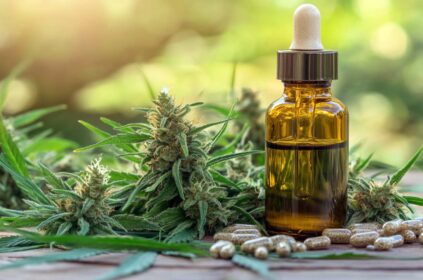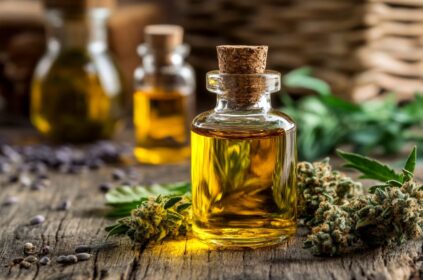In the ever-evolving world of sports and athletics, individuals are constantly searching for innovative ways to elevate their performance and speed up recovery times. Among these methods, Cannabidiol (CBD), a non-psychoactive compound derived from the cannabis plant, has emerged as a prominent topic of discussion. This guide serves as an introduction to the effects of CBD on athletic performance and recovery, shedding light on its potential benefits, underlying mechanisms, and practical applications.
Understanding CBD and Its Effects on the Body
CBD interacts with the body’s endocannabinoid system (ECS), a complex network of receptors and neurotransmitters that plays a vital role in maintaining balance within physiological processes. The ECS consists of two primary receptors: CB1, primarily located in the central nervous system, and CB2, which is more concentrated in immune tissues. When CBD interacts with these receptors, it can influence various body functions, including pain regulation, inflammation control, and sleep patterns.
Benefits of CBD for Athletes
Pain Reduction
One of the most significant advantages of CBD for athletes is its potential to alleviate pain. Many athletes face musculoskeletal injuries and exercise-related soreness, making effective pain management crucial. Studies and anecdotal evidence suggest that CBD can serve as a natural analgesic, offering an alternative to traditional painkillers that often come with unwanted side effects or addictive potential. This is particularly important for athletes who wish to avoid non-steroidal anti-inflammatory drugs (NSAIDs) or opioids while managing their discomfort.
Reducing Inflammation
Following intense exercise, inflammation can be a formidable barrier to recovery and optimal performance. CBD is known for its anti-inflammatory properties, helping to reduce the production of cytokines, chemicals located in the immune system that can promote inflammation. By mitigating the body’s immune response, CBD allows for faster recovery and minimizes the risk of chronic injuries related to inflammation.
Improving Sleep Quality
Quality sleep is paramount for athletes, as it is during these restful hours that muscle repair and overall body restoration occur. Research has shown that CBD may improve sleep quality by promoting relaxation and addressing anxiety that can keep athletes awake. By inhibiting the reuptake of adenosine, a neurotransmitter associated with sleep regulation, CBD can enhance overall sleep and support recovery in athletes.
Managing Muscle Spasms and Nausea
Athletes may experience muscle spasms from strenuous workouts or injuries. CBD’s antispasmodic properties can provide relief, allowing for a more comfortable recovery process. Additionally, CBD has been reported to combat nausea—a common issue for athletes post-exercise—enabling them to maintain their dietary and training regimens without discomfort.
Neuroprotective Effects
The protective aspects of CBD extend to the brain, particularly relevant for contact sports where traumatic brain injuries are a concern. CBD’s ability to reduce inflammation and promote neural regeneration suggests it might play a role in protecting brain health, offering potential long-term benefits for athletes at risk of concussions.
Practical Applications of CBD for Athletes
Choosing the Right CBD Products
Athletes interested in incorporating CBD into their routine encounter an array of product options, including oils, capsules, tinctures, and topical creams. Topical applications can be directly massaged into sore muscles or joints, promoting localized relief. On the other hand, oils and capsules provide systemic benefits. It is crucial for athletes to select high-quality CBD products from reputable brands, ensuring that they are free from contaminants and are accurately labeled regarding their cannabinoid content.
Legal and Safety Considerations
With the World Anti-Doping Agency (WADA) removing CBD from its list of banned substances, athletes can feel more confident about its use. However, it is essential to verify that the products contain minimal THC levels (the psychoactive component of cannabis) to prevent inadvertent doping violations. Overall, CBD is considered safe, non-addictive, and low-risk when sourced responsibly.
Current Research and Controversies
Despite the growing popularity of CBD, research continues to uncover its effects on athletic performance and recovery. A 2023 study from Adelphi University discovered that CBD oil didn’t significantly prevent delayed onset muscle soreness (DOMS), contradicting some of the broader claims about its effectiveness. Many athletes, however, report positive effects, underscoring the need for continued research to untangle the complexities of CBD’s impact.
Conclusion and Actionable Tips
CBD presents a fascinating natural option for athletes striving to enhance their performance and recovery. The potential benefits—ranging from pain relief and inflammation management to improved sleep quality and muscle relaxation—make it an attractive addition to recovery strategies. Here are some actionable tips for athletes considering CBD:
- Consult with a Healthcare Professional: Before adding any supplement to your routine, it’s wise to consult with a healthcare professional to ensure it’s appropriate for your unique needs.
- Choose Reputable Brands: Opt for CBD products from reputable manufacturers that provide transparent labeling and third-party testing results.
- Start with Low Doses: Begin with a low dose of CBD, then adjust as necessary to determine the optimal amount that works best for your body.
- Combine with Other Recovery Techniques: Pair the use of CBD with traditional recovery methods, like stretching, adequate hydration, and nutrition, for a comprehensive approach.
As more research becomes available, the understanding of CBD’s role in athletic performance will continue to evolve. While the current evidence presents promising insights, it is crucial to approach its use thoughtfully and informed. Ultimately, for athletes exploring natural ways to support their performance and recovery, CBD may represent a worthy addition to their toolkit.




















